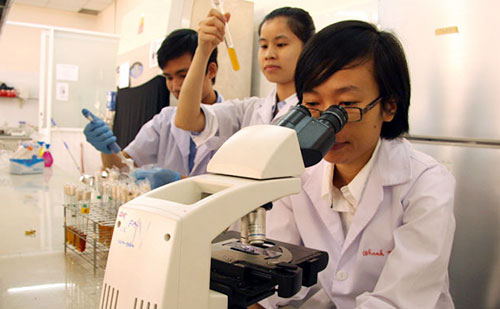Find out how to bring cancer medicine to people more effectively with beneficial bacteria
At the Biotechnology Laboratory of the International University (under the National University of Ho Chi Minh City), scientists have successfully made nanoparticles from beneficial bacteria (beneficial bacteria) to act as transporters. Cancer treatment.
This method can effectively measure the cancer directly to the cancer cells without jeopardizing other living cells nor adversely affecting the health of the patient. This is a new research direction in both Vietnam and the world on cancer treatment.
With the current traditional methods of cancer treatment, using chemotherapy to kill cancer cells that are rapidly arising in the body, you can understand bombs, firecrackers or weapons. Study the residential area to destroy the hidden enemies. While it is possible to ensure the destruction of the enemy, it also destroys mass civilians and destroys the entire neighborhood's infrastructure. Living cells and cells are useful in areas of cancer and the surrounding areas are often severely affected by the "bombardment" of chemotherapy, making the patient's resistance more and more weak. go and be vulnerable to other diseases. That's why sometimes you often hear at the hospital: if you have the ability to prolong life, then start to treat cancer, and if it is heavy, it is better to not treat it if you live longer.

Doan Thi Thanh Vinh (first from the right) and colleagues
In recent times, scientists have been paying attention to the method of making nanoparticles (micro-cells) that mediate cancer drugs directly to each cancer cell to reduce "casualties". " For other living cells, help patients keep good resistance. But the question is what material to use to make these transporting nanoparticles?
Scientists have long focused on finding a chemical that can be used to make transportable nanoparticles . The scientific topic of International University has given a new direction: creating nanoparticles transporting from Lactobacillus bacteria. Highlights of the above method, according to author Doan Thi Thanh Vinh, are: "these particles are bio-origin, non-toxic, so they do not affect other normal cells in the patient's body. to reduce side effects during cancer treatment ".
According to Dr. Nguyen Hoang Khue Tu, the nanoparticles made from Lactobacillus bacteria have a very similar membrane structure to the membrane structure of cancer cells, which helps nanoparticles carry treatment drugs directly into the cancer cells. letter, reduce drug dosage and side effects.
Currently the study has been applied to normal human and cancer cells at the laboratory level, applied to mice at the living body level and gives satisfactory results: healthy cells strong is not attacked. But from research to product and accompanying therapies is a very long way. Hopefully, Vietnamese scientists will bring more achievements, contributing to the world medical community to prevent "outbreak" of this emerging cancer.
- Check out the types of polar bacteria that are beneficial to humans
- Unexpected discovery of beverages and beneficial bacteria supplements
- How do beneficial bacteria protect us?
- Feces of newborns - abundance of bacteria!
- Protect the intestine, reduce cancer with walnuts
- 'Reprogramming' E.Coli bacteria to fight ... cancer
- When do HP bacteria cause stomach cancer?
- Each apple contains up to 100 million beneficial bacteria for health
- Found intestinal bacteria beneficial in chicken eggs
- Green vegetables help boost digestion, prevent bacteria from causing disease
- Ion nozzles help kill bacteria effectively
- Discover more types of beneficial bacteria in the intestinal tract
 Green tea cleans teeth better than mouthwash?
Green tea cleans teeth better than mouthwash? Death kiss: This is why you should not let anyone kiss your baby's lips
Death kiss: This is why you should not let anyone kiss your baby's lips What is salmonellosis?
What is salmonellosis? Caution should be exercised when using aloe vera through eating and drinking
Caution should be exercised when using aloe vera through eating and drinking